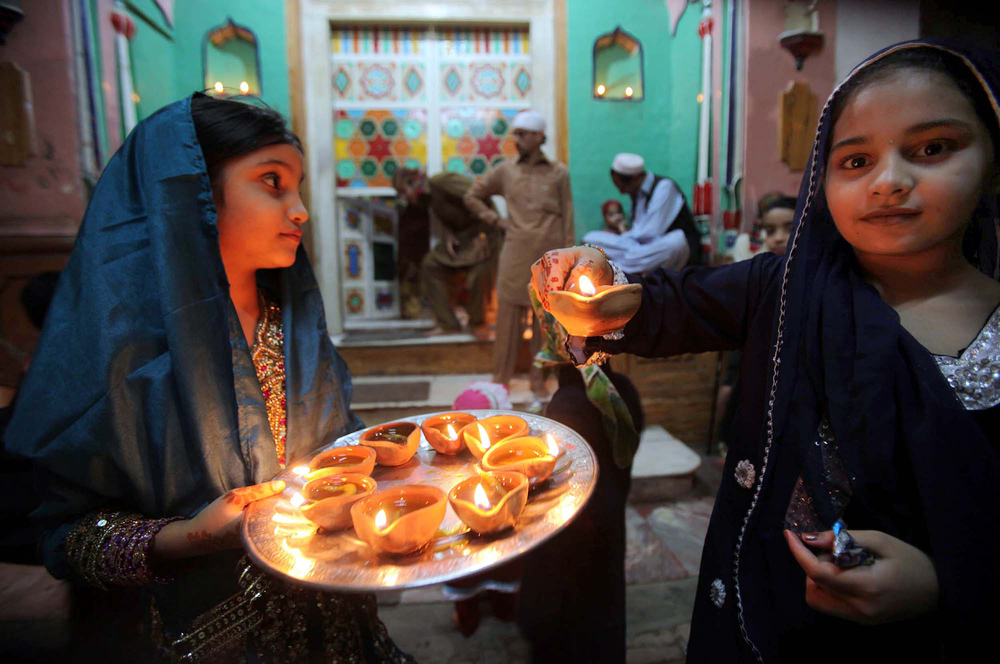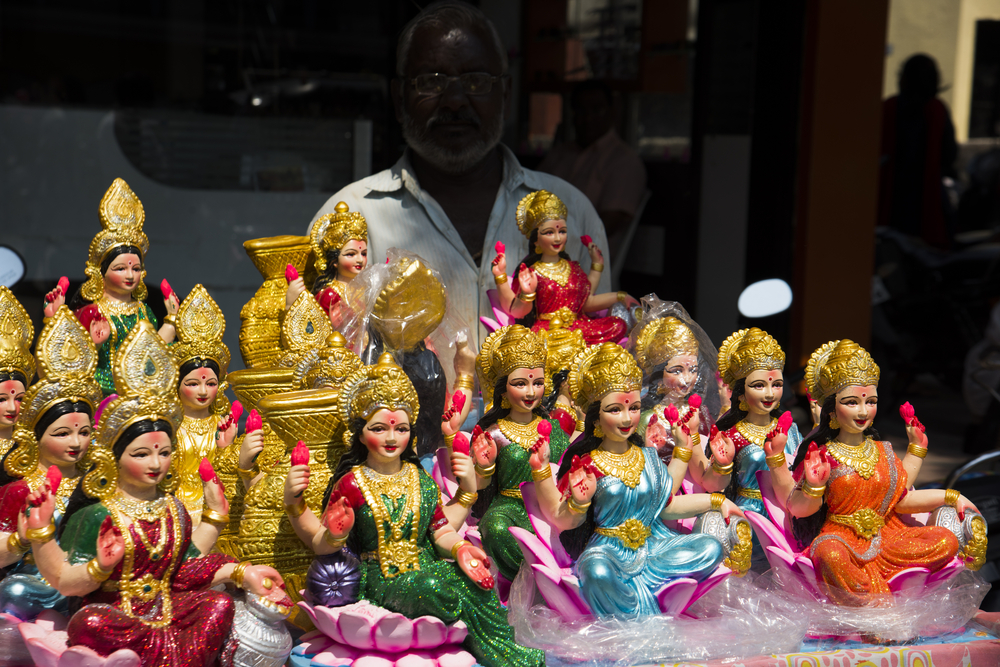Diwali: Hindu Festival of Lights

Diwali, also known as Deepawali, is the Hindu festival of lights. It is celebrated for five days across India and other parts of southern Asia, as well as in many other places around the world. It is the biggest Hindu festival and most important Hindu holiday of the year. During Diwali, people perform cleansing rituals, decorate their homes, gather for special feasts, exchange gifts and light fireworks.
Though the exact dates change depending on local custom, the festival is typically celebrated in the Hindu month of Kartik, which falls in October or November. In 2018, the festival will start on Nov. 5 and end on Nov. 9, according to the Indian Express.
Diwali is "the most awaited and the most celebrated festival of India," according to the Society for the Confluence of Festivals of India (SCFI), an association that promotes awareness of the festival. It is like rolling "a bit of Christmas, New Year's Eve and the Fourth of July all into one," according to Hinduism Today.
The significance of Diwali
Diwali celebrates the light overcoming the dark, according to the SCFI's website, DiwaliFestival.org. The light symbolizes knowledge and wisdom, while darkness is a symbol for all negative forces, such as wickedness, destruction, violence, lust, envy, injustice, greed, oppression and suffering.

Households light dozens of little clay oil lamps, called diyas, to symbolize the triumph of light over darkness, good over evil, and knowledge over ignorance. The word "Diwali," or "Deepawali" in Sanskrit, means "a row of lamps" in Sanskrit.
The festival's roots lie in Hindu scriptures and legends, according to the SCFI, and there are many stories associated with the celebration. For example, Diwali commemorates the triumph of Rama, the lord of virtue, over the demon Ravana, as well as the return of Rama to his kingdom after 14 years of exile.
Hindus also commemorate the victory of the god Krishna over Narakasura, a king who had aligned himself with a demon, causing him to turn evil. Also, Lakshmi, the goddess of wealth — including the wealth of money, pleasure, power, strength, knowledge, peace and children — is said to walk the Earth and bless people. Other legends are celebrated according to different local customs. Sikhs, Jains and Buddhists also celebrate Diwali but mark different events and stories. However, they all symbolize the victory of light over darkness.

The five days of Diwali
The names of the five days of Diwali vary by region. Each day has its own set of traditions and rituals. "The uniqueness of this festival is its harmony of five varied philosophies, with each day to a special thought or ideal," according to the SCFI.
Dhanteras
On the first day of Diwali, called Dhanteras (or Dhanvantari Triodasi, Dhantrayodashi or Dhan Theras), Hindus celebrate the day that Dhanvantari, the god of good health and medicine, emerged from the ocean with the gift of Ayurveda (the knowledge of life) to humanity, according to the SCFI. They also celebrate the day that Lakshmi also came out of the ocean with a pot of gold, according to the Indian Express. "Dhanteras" translates to mean wealth and prosperity.
Leading up to this day, houses and businesses are cleaned and decorated. Floors are decorated with bright, geometric patterns called rangoli, which serve as symbols of good luck and welcome guests and Lakshmi.
The diyas are lighted in every room of the home all night long so that the dark cannot enter. Sweet snacks, called prasad, are offered to Lakshmi and Yama Raj, the god of death, with prayers (puja) for protection from an untimely death.
This is also a major shopping day, especially for new clothes and for gold ornaments and silver utensils, in order to bring luck and prosperity, according to the Indian Express.
Narak Chaturdasi (Choti Diwali)
On the second day of Diwali, known as Choti Diwali orNarak Chaturdasi, Hindus remember Krishna's victory over Narakasura. Others, especially in northern India, celebrate Rama and his victory against Ravana, while those in Bengal worship Kali, the goddess of death. Jains also celebrate Mahaveera, the 24th tirthankara (spiritual teacher) of Jainism and his reaching nirvana, or perfection.
On this day, fewer diyas are lit, and fewer fireworks are set off. Many people take a ritual bath before sunrise, rubbing massage oil and uptan (a paste of garam flour and fragrant powders) onto their bodies to relieve tension. They rest to prepare for fully celebrating Diwali.
Lakshmi Puja
The third day, Lakshmi Puja, is the main day of Diwali festivities. It falls on the night of the new moon. Celebrators clean their houses and themselves, dress in their best clothes and pray to Lakshmi and Ganesha, the god of wisdom and remover of obstacles, according to the Indian Express. The prayer rituals can take hours to perform. Lakshmi is believed to roam the land at night and visit the cleanest house first. Diyas are placed in all the house's windows to welcome the goddess. The night ends with huge feasts and fireworks.
Padwa
The fourth day of Diwali is known as Padwa or Govardhan Puja. Celebrators prepare and offer up a large mountain of vegetarian food to express their gratitude to the gods, according to the SCFI. The day commemorates when Krishna lifted Govardhan Hill to protect villagers from torrential rains and flooding. The mountain of food represents the hill. After the festival, the food is shared by all.
A ritual performed on this day involves building a mound out of mud or cow dung to represent Govardhan Hill, according to the Times of India. The mini-mountain is then adorned with food and flowers and prayers are made to Krishna.
Bhai Duj
The fifth day of Diwali, known as Bhai Duj (also spelled Bhai Dooj)or Bhai Tika (also spelled Bhai Teeka), is dedicated to sisters. According to legend, Yama Raj, the god of death, visited his sister on this day. He gave his sister a vardhan (a blessing), which would be distributed to all those who visited her on that day, freeing them from their sins and allowing them to achieve moksha (final emancipation). Brothers visit their sisters' homes on this last day of Diwali to pray for long life and prosperity.
Additional resources
Sign up for the Live Science daily newsletter now
Get the world’s most fascinating discoveries delivered straight to your inbox.

Rachel Ross is a science writer and editor focusing on astronomy, Earth science, physical science and math. She holds a Bachelor of Arts in Philosophy from the University of California Davis and a Master's degree in astronomy from James Cook University. She also has a certificate in science writing from Stanford University. Prior to becoming a science writer, Rachel worked at the Las Cumbres Observatory in California, where she specialized in education and outreach, supplemented with science research and telescope operations. While studying for her undergraduate degree, Rachel also taught an introduction to astronomy lab and worked with a research astronomer.










